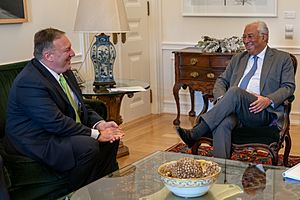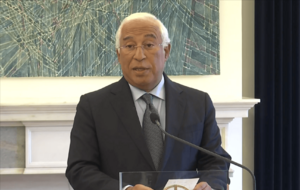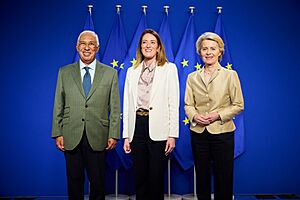António Costa facts for kids
Quick facts for kids
António Costa
|
|
|---|---|
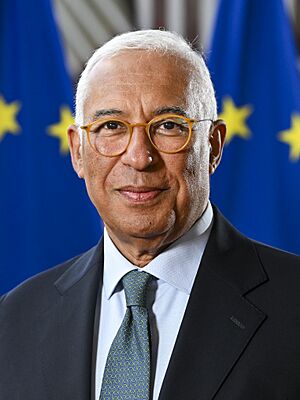
Official portrait, 2024
|
|
| President of the European Council | |
| Assumed office 1 December 2024 |
|
| Preceded by | Charles Michel |
| 118th Prime Minister of Portugal | |
| In office 26 November 2015 – 2 April 2024 |
|
| President | Aníbal Cavaco Silva Marcelo Rebelo de Sousa |
| Preceded by | Pedro Passos Coelho |
| Succeeded by | Luís Montenegro |
| Secretary-General of the Socialist Party | |
| In office 22 November 2014 – 7 January 2024 |
|
| President | Carlos César |
| Deputy | Ana Catarina Mendes José Luís Carneiro João Torres |
| Preceded by | António José Seguro |
| Succeeded by | Pedro Nuno Santos |
| Leader of the Opposition | |
| In office 22 November 2014 – 26 November 2015 |
|
| Prime Minister | Pedro Passos Coelho |
| Preceded by | António José Seguro |
| Succeeded by | Pedro Passos Coelho |
| Mayor of Lisbon | |
| In office 1 August 2007 – 6 April 2015 |
|
| Preceded by | Carmona Rodrigues |
| Succeeded by | Fernando Medina |
| Minister of Internal Administration | |
| In office 12 March 2005 – 17 May 2007 |
|
| Prime Minister | José Sócrates |
| Preceded by | Daniel Sanches |
| Succeeded by | Rui Pereira |
| Minister of Justice | |
| In office 25 October 1999 – 6 April 2002 |
|
| Prime Minister | António Guterres |
| Preceded by | José Vera Jardim |
| Succeeded by | Celeste Cardona |
| Minister of Parliamentary Affairs | |
| In office 27 November 1997 – 25 October 1999 |
|
| Prime Minister | António Guterres |
| Preceded by | António Couto dos Santos |
| Succeeded by | Luís Marques Mendes |
| Member of the Assembly of the Republic | |
| In office 23 October 2015 – 26 March 2024 |
|
| Constituency | Lisbon |
| In office 5 April 2002 – 9 March 2005 |
|
| Constituency | Leiria |
| In office 4 November 1991 – 26 October 1995 |
|
| Constituency | Lisbon |
| Member of the European Parliament | |
| In office 20 July 2004 – 11 March 2005 |
|
| Constituency | Portugal |
| Personal details | |
| Born |
António Luís Santos da Costa
17 July 1961 Lisbon, Portugal |
| Political party | Socialist (since 1975) |
| Height | 1.70 m (5 ft 7 in) |
| Spouse |
Fernanda Tadeu
(m. 1987) |
| Children | 2 |
| Parents |
|
| Alma mater | University of Lisbon |
| Signature | |
| Military service | |
| Allegiance | |
| Branch/service | Portuguese Army |
António Luís Santos da Costa (born 17 July 1961) is a Portuguese lawyer and politician. He has been the President of the European Council since December 2024. Before this, he served as the 118th prime minister of Portugal from 2015 to 2024. He was also the secretary-general of the Socialist Party from 2014 to 2024.
Born in Lisbon, Costa held several important government jobs. He was Secretary of State for Parliamentary Affairs from 1995 to 1997. He then became Minister of Parliamentary Affairs from 1997 to 1999. Later, he was Minister of Justice from 1999 to 2002. From 2005 to 2007, he served as Minister of Internal Administration. He was also the Mayor of Lisbon from 2007 to 2015.
Costa was chosen as the secretary-general of the Socialist Party in 2014. His time as Prime Minister, lasting almost nine years, was the second longest in Portugal's democracy. He was also the longest-serving politician in government roles in Portuguese democracy. He was the longest-serving national leader in the Iberian Peninsula in the 21st century. On 7 November 2023, Costa resigned after an investigation involving members of his government. This investigation was about possible issues with lithium mining and hydrogen projects. The President of Portugal then decided to dissolve Parliament and called for a new election. Costa continued as Prime Minister in a temporary role until 2 April 2024. Luís Montenegro then took over as Prime Minister.
In December 2024, Costa became the President of the European Council. He took over from Charles Michel. As President, Costa has shown strong support for Ukraine during the Russian invasion of Ukraine.
Contents
Early Life and Education
António Luís Santos da Costa was born on 17 July 1961 in Lisbon, Portugal. His father, Orlando da Costa, was a writer, and his mother, Maria Antónia Palla, was a journalist. He has family roots in both Portugal and Goa, India. In Goa, people sometimes call him Babush, which means 'a young loved one' in the Konkani language.
Costa studied law at the University of Lisbon in the 1980s. This is when he first got involved in politics. He was elected as a Socialist representative to the Lisbon municipal council. He finished his required military service in 1987. After that, he worked as a lawyer for a short time in 1988 before focusing on politics full-time.
Political Journey
António Costa joined the Socialist Youth in 1975 when he was 14 years old. In the local elections of 1982, he was elected to the Lisbon municipal assembly. He was re-elected in 1985 and 1989. In the 1991 election, Costa became a member of the Assembly of the Republic for the Lisbon area.
For the 1993 local elections, Costa ran for mayor of Loures, a town near Lisbon. He became well-known for a campaign event where he had a race between a Ferrari and a donkey. This was to show how difficult roads and transport were to Lisbon. He wanted to highlight the need for better roads and a subway connection to Loures. Costa lost the mayoral race by a small amount.
In the 1996 presidential election, António Costa was in charge of Jorge Sampaio's campaign. Sampaio successfully became the President of the Republic. Costa's first job in a Socialist government was as Minister of Parliamentary Affairs. He worked under Prime Minister António Guterres from 1997 to 1999. In Guterres' second term, Costa was Minister of Justice from 1999 to 2002. Costa also helped organize the Expo '98 event in Lisbon.
In the 2002 election, Costa was elected as a member of parliament for the Leiria area. Because his party lost this election, he became the Socialist Party's leader in parliament. Costa also became a member of the European Parliament for the Socialist Party in 2004. He was elected as one of the 14 vice-presidents of the European Parliament on 20 July 2004. He also worked on the Committee on Civil Liberties, Justice and Home Affairs.
Costa left his role as a Member of the European Parliament on 11 March 2005. He then became Minister of State and Internal Administration in the government of José Sócrates. This happened after the 2005 national elections.
Mayor of Lisbon
António Costa left his government jobs in May 2007. He did this to run for mayor of Lisbon, Portugal's capital city. He won the election for Lisbon's mayor on 15 July 2007. He was re-elected in 2009 and 2013, winning by a larger margin each time. In April 2015, he stepped down as mayor. He was already the secretary-general of the Socialist Party and preparing his campaign to become Prime Minister.
Running for Prime Minister
In September 2014, the Socialist Party chose Costa as their candidate for prime minister. This was for the 2015 national elections. He won nearly 70 percent of the votes in a party election. He defeated the party leader, António José Seguro, who then resigned. By April 2015, Costa left his mayor position to focus on his campaign.
During his campaign, Costa promised to reduce strict spending rules. He wanted to give families more money to spend. He suggested increasing incomes, hiring more people, and boosting economic growth. He also aimed to cut taxes for middle and lower-income families. He believed these changes would still help reduce the country's budget deficit. He also promised to remove a very unpopular tax increase on restaurants. He also wanted to bring back some benefits for government workers.
Prime Minister of Portugal
First Term (2015–2019)
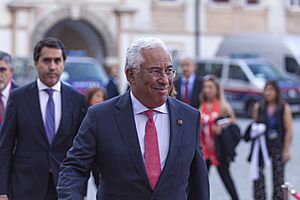
On 4 October 2015, the conservative Portugal Ahead group won the elections with 38.6% of the vote. They had been in power since 2011. The Socialist Party (PS) came second with 32.3%. Pedro Passos Coelho became Prime Minister again. However, António Costa formed an alliance with other left-wing parties. These included the Left Bloc, the Portuguese Communist Party, and the Ecologist Party "The Greens". Together, they had a majority in Parliament. They removed the conservative government on 10 November. After this, President Aníbal Cavaco Silva chose Costa as the new prime minister on 24 November. He officially took office on 26 November.
By March 2017, polls showed that support for Costa's Socialists was at 42 percent. This was 10 points higher than their vote in the 2015 election. It was almost enough to give them a majority in parliament. In the 2017 local elections, Costa's party gained even more power. They won a record 158 town halls out of 308 cities and towns in Portugal. Across the country, the Socialists' vote share was over 38 percent.
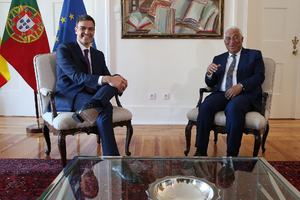
During his time as Prime Minister, Portugal faced its deadliest wildfires. The first was in Pedrogão Grande in June 2017, which killed 65 people. Later, in October 2017, fires across the country killed 41 people. In October 2017, the opposition People's Party (CDS) tried to remove Costa's government. They said the government failed to prevent the loss of lives in the fires. This attempt was mostly symbolic, as the Socialist government still had support from other left-wing parties in parliament.
In April 2018, Reuters reported that Costa's government had managed to control spending. At the same time, they supported economic growth. They also reversed most of the strict spending rules put in place by the previous government. Many changes were made during Costa’s first term. These included social support for children and free books for all students up to age 18. Public transport tickets became much cheaper, and there was a special electricity price for low-income families.
In early 2019, Costa's government survived another attempt to remove them. This was due to public sector strikes. Before the 2019 national elections, Costa said he would not form a coalition government with far-left parties. He expected his party to win but not get a full majority. Instead, he preferred to continue working with the Communists and/or the Left Bloc in parliament. He did not want them to have government ministers in a formal coalition.
Second Term (2019–2022)
Costa's second government started on 26 October 2019. It was the largest government in Portugal's democracy, with 70 members. This included 20 ministers and 50 secretaries of state. This government was not very stable because the left-wing parties could not agree. For example, when voting on the 2020 budget, the Left Bloc and the Communist Party did not vote for it. Only the Socialists voted in favor.
Despite political instability, the second government mainly dealt with the COVID-19 pandemic. The first case appeared on 2 March 2020. Soon after, the government declared a state of emergency and issued a lockdown. The lockdown and restrictions were lifted in June 2020. However, new measures were put in place in the following months as infections and deaths increased. By mid-2022, Portugal was one of the countries most affected by the pandemic.
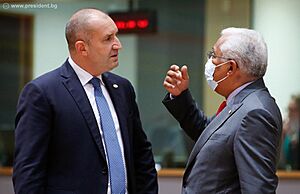
The COVID-19 vaccination campaign in Portugal was very successful. It was led by Admiral Henrique Gouveia e Melo, who the government appointed. More than 28 million vaccines were given, and almost 9 million people were fully vaccinated. This meant 85% of the population was vaccinated, one of the highest rates in the world.
From 1 January to 30 June 2021, António Costa led the Council of the European Union. In the 2021 local elections, the Socialist Party remained the largest party. However, they lost many cities, especially Lisbon, to a center-right group. These results were seen as a "yellow card" for António Costa. At the same time, the left-wing parties threatened to reject the 2022 budget. They wanted more changes from Costa's government. The President warned that rejecting the budget would lead to new elections. This happened when the left-wing parties joined with the right-wing parties and rejected the 2022 budget. This was the first time a budget was rejected in Portugal's democracy. New elections were called for 30 January 2022.
More changes were made during Costa’s second term. These included a new law for housing and city planning. Free early childhood education was extended to all children who needed it. Bereavement leave was also extended. Employers were also required to avoid contacting employees outside of regular work hours.
Third Term (2022–2024)
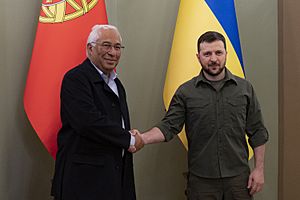
Costa was re-elected in the 2022 Portuguese legislative election. The Socialist Party won 120 seats, up from 108, gaining a clear majority in the Assembly. Before the election, polls suggested Costa and the Socialist Party would be the largest party but would need help from others to get a majority. In his victory speech, Costa thanked voters for giving him "increased responsibility." He promised to govern "with and for all Portuguese." This allowed him to form the XXIII Constitutional Government of Portugal.
During Costa’s third term, several changes were made to the country’s Labour Code. However, his third term was affected by many resignations. These were due to allegations of past misconduct or questionable practices. This negatively impacted his popularity in opinion polls. 11 ministers and secretaries of state left their jobs. The most notable situation involved TAP. Infrastructure Minister Pedro Nuno Santos resigned in December 2022. This followed public concern over a large payment a secretary of state received from state-owned TAP.
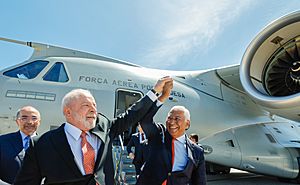
Costa replaced Santos with João Galamba. Galamba resigned in May 2023 as the TAP situation continued. Opposition parties said Galamba had not told parliament that he suggested the TAP CEO meet with Socialist lawmakers. This meeting was to prepare for a parliamentary hearing about her payment. The CEO was later fired after an official review found the payment was not legal. Galamba first said the meeting was TAP's idea. But he later admitted he told the CEO she could attend a meeting with his advisors.
Galamba also said one of his advisors, who took notes at the meeting, had been fired. This advisor took a laptop with private information. The national intelligence service, SIS, later got the laptop back. This led to accusations from the opposition that the government went too far. They said such cases should be handled by the police. Costa denied that he or anyone in the government ordered SIS to get the laptop. He also said he would not accept Galamba's resignation. He kept him in the job, even though President Marcelo Rebelo de Sousa and the opposition wanted him to resign. President Rebelo de Sousa warned that Costa's government needed to keep its credibility. However, he did not use his power to dissolve parliament.
Resignation
On 7 November 2023, Portuguese prosecutors detained Costa's chief of staff, Vítor Escária. They also named João Galamba as a formal suspect in an investigation. This investigation was about possible issues in lithium mining, green hydrogen production, and data center deals. Over 40 searches were carried out, including in government offices. Costa was also under suspicion of allowing these deals. He was to be questioned by the Supreme Court of Justice.
In a televised statement that afternoon, Costa announced his resignation as prime minister. He said that the "dignity of the functions of prime minister is not compatible with any suspicion about his integrity." He added that it was not compatible with any suspicion of "the practice of any criminal act."
The President of the Republic, Marcelo Rebelo de Sousa, accepted Costa's resignation that same day. However, Costa's resignation and his government's official end happened on 8 December. This was to allow the State Budget for 2024 to be approved. The Assembly of the Republic was also dissolved. The president scheduled new elections for 10 March 2024. Costa's government stayed in office in a temporary role until the new government, led by Luís Montenegro, took over after the elections.
The investigation has since received criticism. Prosecutors admitted some mistakes, including confusing the names of António Costa and then Minister of Economy António Costa Silva in a recorded conversation.
Costa became the longest-serving Portuguese prime minister during Portugal's democracy. He led the government longer than any other national leader in the Iberian Peninsula in the 21st century.
President of the European Council
After the 2024 European Parliament election, Costa was seen as the top candidate for the Presidency of the European Council. On 27 June 2024, the leaders of the 27 EU member states elected António Costa as President of the European Council. This is one of the three most important leadership roles in the European Union. He began his term on 1 December 2024.
As President of the European Council, Costa confirmed his support for the Ukrainian government of Volodymyr Zelenskyy. This was on the third anniversary of the 2022 Russian invasion of Ukraine.
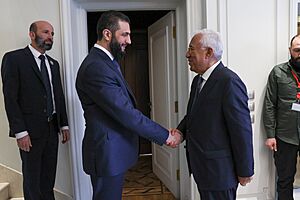
In March 2025, Costa met with Syrian President Ahmed al-Sharaa in Cairo, Egypt. This meeting took place at an emergency summit of the Arab League about Gaza.
Personal Life
In 1987, Costa married Fernanda Maria Gonçalves Tadeu, who is a teacher. They have a son and a daughter. Costa also has Overseas Citizenship of India.
Costa is a fan of the football club S.L. Benfica. He often watched their matches when he was mayor of Lisbon. He also went with Benfica to both UEFA Europa League finals in 2013 and 2014.
Honours
National Honours
 Grand Cross of the Military Order of Christ (25 November 2024)
Grand Cross of the Military Order of Christ (25 November 2024) Grand Cross of the Order of Prince Henry (1 March 2006)
Grand Cross of the Order of Prince Henry (1 March 2006)
Foreign Honours
 Brazil:
Brazil:
- Grand Cross of the Order of Rio Branco (29 May 2023)
- Commander of the Order of Rio Branco (19 May 2014)
 Chile: Grand Cross of the Order of Merit (31 August 2010)
Chile: Grand Cross of the Order of Merit (31 August 2010) Estonia: Third Class of the Order of the Cross of Terra Mariana (16 July 2010)
Estonia: Third Class of the Order of the Cross of Terra Mariana (16 July 2010) Greece: Grand Cross of the Order of Honour (21 April 2017)
Greece: Grand Cross of the Order of Honour (21 April 2017) Holy See: Knight Grand Cross of the Order of St. Gregory the Great (3 September 2010)
Holy See: Knight Grand Cross of the Order of St. Gregory the Great (3 September 2010) Japan: Grand Cordon of the Order of the Sacred Treasure (16 February 2015)
Japan: Grand Cordon of the Order of the Sacred Treasure (16 February 2015) Lithuania: Grand Cross of the Order for Merits to Lithuania (16 July 2010)
Lithuania: Grand Cross of the Order for Merits to Lithuania (16 July 2010) Luxembourg: Grand Cross of the Order of Merit of the Grand Duchy of Luxembourg (28 June 2019)
Luxembourg: Grand Cross of the Order of Merit of the Grand Duchy of Luxembourg (28 June 2019) Norway: Grand Cross of the Royal Norwegian Order of Merit (25 September 2009)
Norway: Grand Cross of the Royal Norwegian Order of Merit (25 September 2009) Poland:
Poland:
- Commander's Cross with Star of the Order of Merit of the Republic of Poland (16 February 2015)
- Commander's Cross with Star of the Order of Polonia Restituta (18 July 2012)
 Sovereign Military Order of Malta: Grand Cross of the Order pro merito Melitensi (23 November 2010)
Sovereign Military Order of Malta: Grand Cross of the Order pro merito Melitensi (23 November 2010) Spain: Grand Cross of the Order of Charles III (25 November 2016)
Spain: Grand Cross of the Order of Charles III (25 November 2016) India: Pravasi Bharatiya Samman for Public Services (2017)
India: Pravasi Bharatiya Samman for Public Services (2017)
See also
 In Spanish: António Costa para niños
In Spanish: António Costa para niños
- List of heads of state and government of Indian origin
 | Claudette Colvin |
 | Myrlie Evers-Williams |
 | Alberta Odell Jones |


